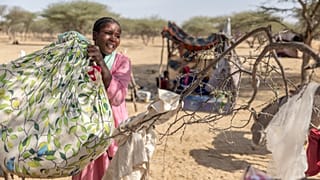Mauritania
Climate change has caused an increase in desertification.
The consequence for countries such as Mauritania is a significant drop in the agricultural production of some regions, leaving farmers struggling to grow enough food to eat or sell.
"The risks related to the volumes of rainfall caused negative effects on the soil in terms of gullying and degradation. This means that as a result of the reduction of these areas, the production has been significantly reduced", said IFAD (UN's International Fund for Agricultural Development) project manager for Mauritania, Ahmed Ould Amar.
The region of Guidimakha used to have significant rainfall, up to 1600mm in the 1990s, now rainfall barely reaches 400mm.
"We had a problem with irrigation water, and we had no fencing against the animals that destroyed our crop, and we used to work only in the fall and winter seasons" said Zeinebou Mint Mohamed Mahmoud, a local female farmer.
A new project implemented by the UN's International Fund for Agricultural Development aims to make better use of scarce resources.
"This project helps us with irrigation machines and water tank pumps, seeds and fences and bigger water pipes. It helps us farm and we thank them for that", concluded the farmer.
Politicians and experts met last week in Madrid to discuss ways to tackle drought and the increasing spread of deserts across the globe.











01:00
Farmers leave Paris but tensions rise in Toulouse over EU-Mercosur trade deal
01:00
French farmers protest EU Mercosur deal with tractors in Paris
00:56
French farmers protest outside Macron’s over EU-Mercosur deal
01:00
Farmers from 27 EU countries protest and clash with police in Brussels over EU-Mercosur trade deal
00:24
South Sudan families battle rising Nile floods to survive
01:02
First rain of autumn falls in Iran's capital after months of intense drought